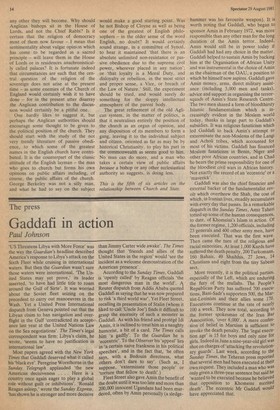The press
Gaddafi in action
Paul Johnson
'US Threatens Libya with More Force' was the way the Guardian's headline described America's response to Libya's attack on the Sixth Fleet while cruising in international waters. But then the Guardian wasn't sure those waters were international. 'The United States may yet prove,' its leader asserted, 'to have had little title to roam around the Gulf of Sirte'. It was worried about the Soviet fleet seizing on the precedent to carry out manoeuvres in the Wash. Yet a United Press International dispatch from Geneva pointed out that the Libyan claim to ban navigation and overflight in the Gulf 'contradicted its acceptance last year at the United Nations Law on the Sea negotiations'. The Times's legal correspondent was firm: Libya's claim, he wrote, 'seems to have no justification in international law'.
Most papers agreed with the New York Times that Gaddafi deserved what it called his 'black eye'. Peregrine Worsthorne in the Sunday Telegraph applauded 'the new American decisiveness . . . . Here is a country once again eager to play a global role without guilt or inhibitions'. 'Ronald Reagan asleep,' wrote the Sunday Express, 'has shown he is stronger and more decisive than Jimmy Carter wide awake'. The Times thought that 'friends and allies of the United States in the region' would 'see the incident as a welcome demonstration of the American presence'.
According to the Sunday Times, Gaddafi is 'openly called' by Reagan officials 'the most dangerous man in the world'. A Reuter dispatch from Addis Ababa quoted Gaddafi as saying that he was now prepared to risk 'a third world war'. Yet Fleet Street, recalling its presentation of Stalin (whom it liked to call 'Uncle Joe') finds it difficult to grasp the enormity of such a monster as Gaddafi. As with his friend and protégé Idi Amin, it is inclined to treat him as a naughty humorist, a bit of a card. The Times calls him 'a gadfly'. To the Guardian he is 'eccentric'. To the Observer his 'appeal' lies in 'a certain naive frankness in his political speeches', and in the fact that, 'he often says, with a Bedouin directness, what others don't dare to say'. (Such as, I suppose, 'exterminate those people' or 'torture that fellow to death'.) Fleet Street also gave Amin the benefit of the doubt until it was too late and more than 200,000 innocent Ugandans had been murdered, often by Amin personally (a sledge hammer was his favourite weapon). It is worth noting that Gaddafi, who began to sponsor Amin in February 1972, was more responsible than any other man for the long duration of the Amin terror. Indeed, Amin would still be in power today if Gaddafi had had any choice in the matter. Gaddafi helped to sustain Amin by backing him at the Organisation of African Unity and was instrumental in the choice of Amin as the chairman of the OAU, a position to which he himself now aspires. Gaddafi gave Amin money, arms, direct military assistance (including 3,000 men and tanks), advice and support in organising the terrorsquads of Amin's State Research Centre. The two men shared a form of bloodthirsty Islamic fundamentalism which is increasingly evident in the Moslem world today, thanks in large part to Gaddafi's subsidies. It was religious fanaticism which led Gaddafi to back Amin's attempt to exterminate the non-Moslems of the Langi and Acholi tribes, which accounted for most of his victims. Gaddafi has financed Moslem fanaticism in Benin, Niger and other poor African countries, and in Chad he bears the prime responsibility for one of the bloodiest civil wars in African history. Not exactly the record of an 'eccentric' or a 'maverick'.
Gaddafi was also the chief financier and external backer of the fundamentalist revolt which overthrew the Shah, the cost of which, in Iranian lives, steadily accumulates with every day that passes. In a remarkable dispatch in the Sunday Times, Amir Tahen totted up some of the human consequences, to date, of Khomeini's Islam in action. Of the former regime, 1,200 officials, including 23 generals and 400 other army men, have been executed. That was the first wave. Then came the turn of the religious and racial minorities. At least 1,000 Kurds have suffered the death penalty, 200 Turkomans, 160 Bahais, 49 Shaihhis, 27 Jews, 14 Christians and eight from the tiny Sabean sect.
More recently, it is the political parties, especially of the Left, which are enduring the fury of the mullahs. The People's Republican Party has suffered 700 executions, Bani-Sadr's supporters 500, the Marxist-Leninists and their allies some 170. Executions continue at the rate of nearly 100 a week. They now total, according to the former spokesman of the Iran Bar Association, 'over 8,000'. A mere confession of belief in Marxism is sufficient to invoke the death penalty. The 'legal execution age' is 15 for boys and only nine for girls. Indeed in June a nine-year-old girl was shot on charges of 'attacking the revolutionary guards'. Last week, according to the Sunday Times, the Teheran press reported that several men had been executed at their own request. They included a man who was only given a three-year sentence but said he 'wanted to be executed because he believed that opposition to Khomeini merited death'. The eccentric Mr Gaddafi would have appreciated that.


































 Previous page
Previous page